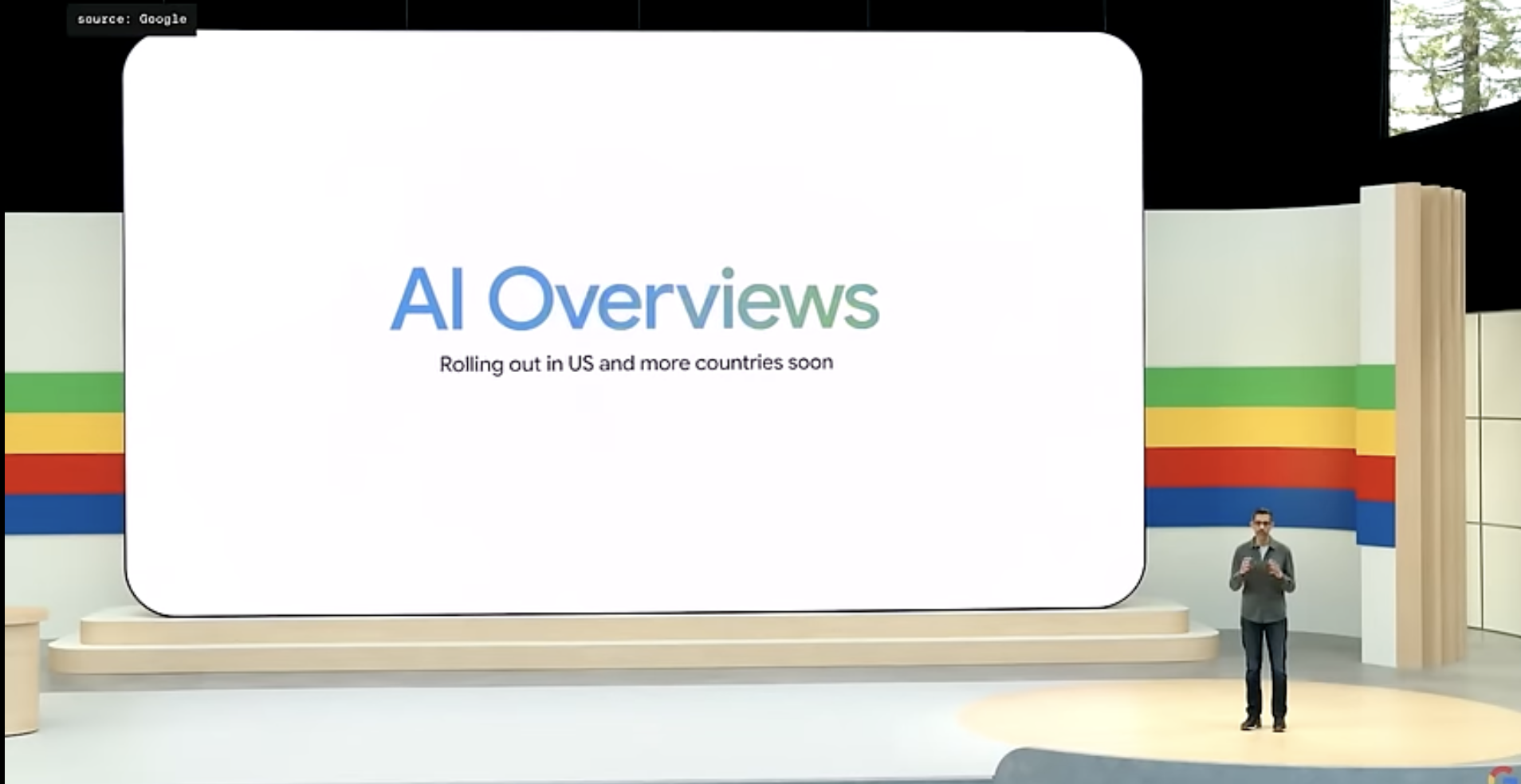The proven all-in-one platform to maximize ad revenue
Protect your ad revenue against invalid traffic and ad fraud

This post was most recently updated on May 20th, 2024
Google’s recent rollout of AI Overviews in the US, with plans for expansion to more countries, has sparked discussions about its implications for publishers. This blog post delves into how this new feature may affect publishers’ traffic and provides insights on what publishers can do to navigate Google I/O 2024 effectively.
AI Overviews is a new feature in Google Search that leverages generative AI technology to provide concise answers to complex queries. It offers users a more direct way to access information compared to traditional search results.
What you missed on AI Overviews:
While AI Overviews aim to provide helpful answers, there are concerns about their accuracy. Users can report harmful or inaccurate AI Overviews by clicking on the three dots at the top of the result. Google has stated that AI Overview results are likely to improve over time as technology advances.
AI Overviews offer a more streamlined and interactive way for users to access information directly from search results. They focus on providing quick answers to complex queries, which differs from traditional web search results, which present a list of links to websites for users to explore in more depth.
AI Overviews differ from traditional web search results in several key ways:
The technology behind AI Overviews is powered by Google’s Gemini model, which combines advanced capabilities like multi-step reasoning, planning, and multimodality with Google’s Search systems.
AI Overviews utilize generative AI technology to provide concise answers to complex queries.
The AI-generated link cards within AI Overviews are created based on Google’s understanding of the query and the content available on the topic across the web.
Google has been testing AI Overviews for the past year, serving billions of queries using generative AI. The Gemini model, customized for Google Search, brings together advanced capabilities to power AI Overviews and provide users with helpful answers directly in the search results.
Introducing AI Overviews raises concerns for publishers, as users may increasingly rely on these AI-generated answers rather than clicking through to websites. This “zero-click” effect could lead to a decline in traffic for publishers, mirroring the impact of Google’s previous introduction of direct answers in search results.
While Google claims that links included in AI Overviews generate a higher click-through rate than traditional web search results, there are reasons to be skeptical of this claim.
The design of AI Overviews suggests that the web links feel like an afterthought, making it hard to believe that they truly support direct traffic to websites.
Google has stated that it will report on clicks and impressions from AI Overviews in Search Console, but it will not separate the data for AI Overviews from normal web search clicks. This lack of transparency leads to the belief that if site owners could see the data for their individual sites, the results might not align with Google’s claims.
The featured snippet, a similar feature, has been shown to have a mixed impact on website traffic. While it can be beneficial for one site, it can also negatively impact the rest of the search results. It remains to be seen if AI Overviews will have a similar effect.
Google’s statement about AI Overviews receiving more clicks than traditional web search results may be carefully worded. The result in an AI Overview card might get more clicks or engagement than the average of the first page, as it is being compared to the 8-10 positions. However, it is highly unlikely that an AI Overview would get more engagement than if the listing was ranking in the first position without an AI Overview.
To prevent a page from appearing in Google’s AI Overviews, you can utilize the “nosnippet” tag within the page’s HTML code. This tag serves as a directive to Google, indicating that the content should not be included in AI Overviews.
Glenn Gabe, an SEO expert, conducted a test to validate the effectiveness of this practice. In his experiment, he observed that a page from his site was initially featured in an AI Overview. However, after implementing the “nosnippet” tag and prompting a recrawl, Google excluded his site from the AI Overview.
Note that opting to exclude a page from AI Overviews may have consequences.
By removing the content from AI Overviews, the search result appearance may be affected, potentially leading to a lack of description in the search results. This trade-off highlights the decision content creators face: allowing Google to use their content for AI Overviews or choosing to restrict certain data from appearing on the search engine results page.
Google’s AI Overviews represents a significant evolution in search technology, aiming to provide users with a cleaner and simpler way to access information. While this may improve the user experience, it also underscores the complex relationship between Google and content creators. As Google seeks to clean up the web by providing more direct answers, it may inadvertently harm the very content creators it relies on for information.
In conclusion, AI Overviews signify a new era in search technology, with far-reaching implications for the web economy. As Google continues to innovate and expand its AI capabilities, it is crucial for content creators to adapt and find ways to remain relevant in a search landscape increasingly dominated by AI-generated answers.

With over ten years at the forefront of programmatic advertising, Aleesha Jacob is a renowned Ad-Tech expert, blending innovative strategies with cutting-edge technology. Her insights have reshaped programmatic advertising, leading to groundbreaking campaigns and 10X ROI increases for publishers and global brands. She believes in setting new standards in dynamic ad targeting and optimization.
10X your ad revenue with our award-winning solutions.